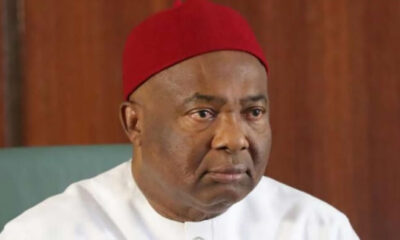Politics
Port-Harcourt Refinery Petrol Price Higher Than Dangote’s By N75 – PETROAN

The Petroleum Products Retail Outlets Owners Association of Nigeria (PETROAN) has said the price of Premium Motor Spirit churned out by the old Port Harcourt Refinery which resumed production on Tuesday, is ₦75 per litre higher than that sold by the Dangote Refinery.
This was revealed by the association’s Public Relations Officer, Dr. Joseph Obele, during the official reopening ceremony of the refinery, which is now operating at a capacity of 60,000 barrels per day.
Dr Obele, a former chairman of the Independent Petroleum Marketers Association of Nigeria (IPMAN) at the Port Harcourt Deport who initially applauded the federal government for revitalising the old refinery, expressed concern over the pricing disparity between petrol supplied by the Nigerian National Petroleum Company Limited (NNPCL) and the Dangote Refinery.
According to him, while Dangote Refinery sells petrol to marketers at ₦970 per litre, NNPCL’s price stands at ₦1,045, a difference of ₦75 per litre.
He said the ₦75 price differential is a steep margin for businesses, particularly for an industry where profitability hinges on competitive pricing.
He, however, described the refinery’s restoration as a significant step in reducing Nigeria’s dependence on imported petroleum products.
Obele revealed that the Group Chief Executive Officer of NNPCL, Mele Kyari, has promised to address the issue and harmonise prices to mitigate the impact on marketers and consumers.
The reopening of the Port Harcourt Refinery is expected to enhance local production capacity and reduce reliance on imports, a move welcomed by stakeholders across the sector.
However, concerns over pricing disparities underscore the need for continuous reforms to stabilise the downstream sector of the petroleum industry.


 Top Stories16 hours ago
Top Stories16 hours agoTinubu bans homosexuality, cross-dressing in Nigerian Military

 Top Stories16 hours ago
Top Stories16 hours agoIbadan Stampede: How Organizers Could Have Avoided Children’s Death – Governor Makinde

 News16 hours ago
News16 hours agoGermany revises immigration policies to attract skilled workers for 2025

 News16 hours ago
News16 hours agoImo Governor, Uzodinma Appeals To Unknown Gunmen To Lay Down Arms

 News13 hours ago
News13 hours agoInvestigative journalist Fisayo Soyombo, Nigeria Customs Boss And Us

 Politics16 hours ago
Politics16 hours agoEdun: Tinubu’s Reforms Save Nigeria ₦930 Billion, Drive Economic Recovery

 News9 hours ago
News9 hours agoLIRS Sets January 31 Deadline for Annual Tax Returns Filing by Employers







